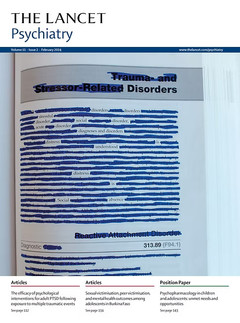Supporting trauma survivors’ through art and science
- Isaac Ouro-Gnao

- Apr 24, 2025
- 5 min read
According to the World Health Organisation (WHO), the majority of people who access mental health services have experienced trauma. Yet, trauma remains misunderstood, misdiagnosed, and mistreated. How then can we best support survivors who need holistic, relatable, consistent, and trauma-sensitive healthcare?

I’m Isaac, a writer, multidisciplinary artist, and lived experience researcher at Traumascapes – a survivor-led organisation dedicated to changing the ecosystem of trauma and supporting survivors through art and science.
To understand our collective mission, let’s start with the words of our founder & CEO Laura E. Fischer and art manager & researcher Sullivan Holderbach.
“Living with the lasting impacts of trauma on the mind, brain, and body makes recovery, a return to what was, impossible. Instead, we turn to the arts for new avenues that do not bring us back but forward. Creativity is not only the space where ‘what could be’ can emerge but, for trauma survivors, it is the channel through which agency can be reclaimed and embodied healing can occur.”
Healing through Art as a Survivor

Art has been and continues to be a lifeline for many survivors. It allows us to explore, take ownership of, and tell our stories on our own terms.
As a survivor, I use dance, film, and poetry as creative tools for healing my adverse childhood experiences and mental health difficulties – most notably through #BlackBoyJoyGone, a film I co-directed with artist Ashely Karrell to explore Black men's mental health through magical realism. The process was joyful yet difficult, leaving me with questions about making art trauma-sensitive to better support myself and others in my communities.
These questions led me to enrol in the Creative Arts and Mental Health MSc at Queen Mary University of London (QMUL) in 2022, and ultimately to Traumascapes.
Traumascapes Arts Collective
I first met Laura during a lecture at QMUL on trauma, body-based interventions, embodied healing, the importance of art in agency, trauma-sensitive practice, and lived experience expertise.
“Healing cannot be solely thought through, it must be experienced and embodied, and experiencing in community is vital for survivors,” Laura said. And it quickly dawned on me that such a space was exactly what I was looking for.
I was subsequently invited to join the Tramuscapes Arts Collective (CAT) – a space to be in a community with survivors, gain an understanding of my own experience, and carry out bold, disruptive, and caring work through interdisciplinary art projects, publications, exhibitions, workshops, and art-based peer support.
Our first project as a collective – Julie-Yara Atz, Gavin Edmonds, Laura E. Fischer, Sullivan Holderbach, Isaac Ouro-Gnao, Julian Triandafyllou, and most recently, Ngozi "N/A" Oparah – explores what survivorhood means to us, individually and collectively, and how this changes over time.
The Living Archive of Survivorhood of Trauma (LAST) is a living archive, currently with
12 artworks published as covers of The Lancet Psychiatry journal throughout 2024 with accompanying creative responses published on our website. It positions the archive as a gateway for individuals, researchers, and practitioners to understand the lived experience of trauma and, ultimately, better support survivors.
“To be a survivor is to search continuously for ways to resituate oneself into a world that has violently removed one’s agency,” we said in our collective essay for the journal. “LAST is a living archive because, like us, it is alive, growing, ever-changing – leaving space for discovery and multiplicity and enabling an understanding of survivorhood that is diverse, contextually responsive, and expansive.”
We’re excited to share these and new artwork at our first arts festival, from 24th–27th April 2025 at The Art Pavilion in Mile End, London.
The Survivor Lens
We also work extensively with our networks and communities in this same mission. In 2023, Laura and filmmaker and Traumascapes advisor, Andrea Luka Zimmerman, curated an event featuring film screenings titled The Survivor Lens: Reframing Trauma Narratives through Filmmaking at the Whitechapel Gallery. The event, exploring the role of artists’ films in reframing trauma narratives, was also hosted by the Mental Health Foundation as part of the Scottish Mental Health Arts Festival.
Mania Akbari’s How Dare You Have Such a Rubbish Wish takes a radical approach to revisiting Iranian pre-revolutionary cinema, engaging with actresses long banned from their own country’s visual culture, allowing them to “speak” through movement.

Similarly, Her Plot of Blue Sky by Kamila Kuc foregrounds the often-invisible lives of elderly and marginalised Moroccan women as they reshape how they are seen in media and how they see themselves.

Survival and transformation are central in Leaving Syria: Long Live the Youth by Julie-Yara Atz, Sounding the Voices by Andrea Luka Zimmerman, and Anti Zweena by Laura Fischer. The former follows young Syrians using music and friendship as tools for endurance while navigating forced displacement, while the latter two explore how survivors of different forms of violence use sound, movement, and image to shift personal trauma into collective healing.

I Don’t Know Your Name by Julian Triandafyllou re-stages the night of his assault in a way that foregrounds memory retrieval as an unsettling but necessary confrontation with past and current harm. #BlackBoyJoyGone, co-directed by Ashley Karrell and I, shifts this conversation to Black men in the UK, exploring the legacy of mental health difficulties, child sexual abuse, and healing as a community process.
“I deeply appreciated, as a trauma survivor still in recovery, the care with which we were held and supported,” said one attendee, reflecting on the “very moving, thought-provoking, and inspiring” experience they had.
“I have never had two complete strangers come up to me, on the street and in a shop, to say how overwhelmed and grateful they were to attend this symposium,” said Gareth Evans, curator and host at the Whitechapel Gallery. “One that they were amazed – but delighted – could happen, and wishing there could be more.”
T.R.A.U.M.A. Card Deck
Our art-based advocacy also integrates survivor-led research. We work to develop new trauma-sensitive, effective methods and approaches to support trauma healing and restore survivors' self-power. We design creative and impactful research outputs in order to support the sharing of research findings and make them accessible beyond academia.
One of our projects we’ve witnessed have a lasting, tangible impact is the interactive card deck T.R.A.U.M.A. (Towards Recognition of Abuse, Understanding, and Mutuality through Arts). The cards are designed – through collaboration with Survivor’s Voices and King’s College London – to facilitate conversations about child abuse and trauma, and to help people get better at recognising and addressing abuse.
They were created by a collective of artists and researchers who all have lived experience of abuse and trauma. These cards, made for adults and young people over 16, can be used by anybody, in personal as well as clinical settings
They have recently been integrated in the Tavistock & Portman NHS Trust course on ‘Child sexual abuse disclosure: how to support adult survivors (DAA019)’ and adopted by their arts therapy team, enabling more clinicians to use survivor-designed trauma-sensitive therapeutic tools and, therefore, more trauma survivors to benefit from these.
These are just a few of the many projects that reflect our deep commitment to a trauma-sensitive, care-driven, person-centred approach. As survivors, it is essential that we not only honour our own voices, but also amplify the individual and collective voices of those we work with. By centring their experiences, we challenge dominant narratives, reshape how trauma is understood, and create space for healing on our own terms.
Creative explorations and artistic expressions lie at the heart of our resistance. As we head towards our first arts festival, from the 24th to 27th April 2025 at The Art Pavilion in Mile End, London, we hope to continue creating spaces for understanding, hope, liberation, beauty, and healing.




















